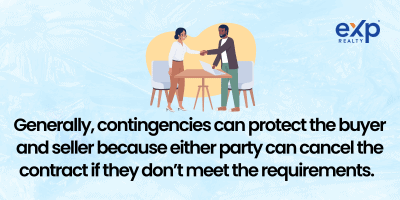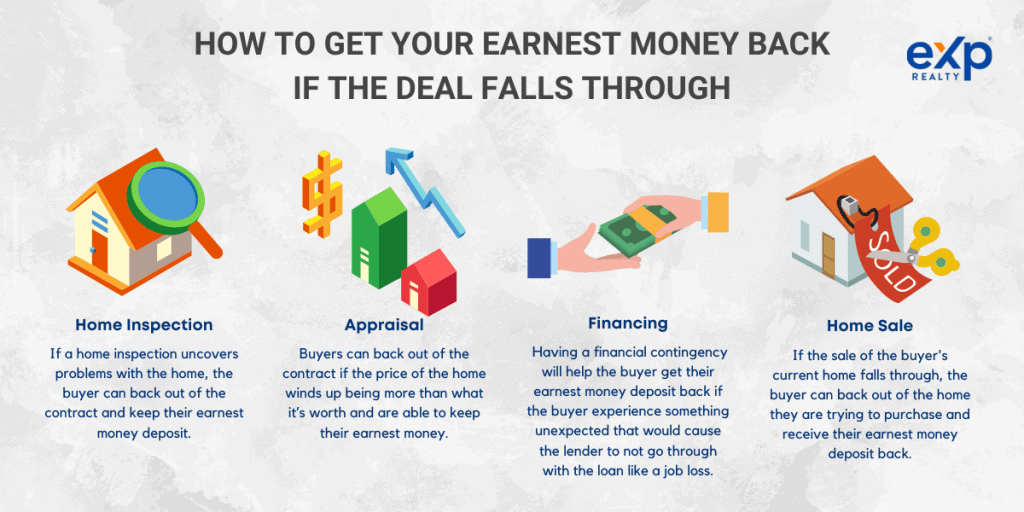When you’re a prospective buyer in house hunting or a seller amid a home sales process, you will need to learn about the most common contingencies in real estate. What does contingent mean? It entails the current buyer going through with a home sale if the seller meets the requirements.
The seller may also have contingent requirements in the purchase agreement, such as the buyer having a mortgage lender and financing confirmation. The categories of real estate contingencies include a home inspection contingency, a sale contingency, and an appraisal contingency.
Whether you’re buying real estate in Florida or homes for sale Texas, it’s important for every homebuyer to learn about the contingent definition in real estate. Let’s get started!
What Does Contingent Mean in Real Estate?
When you see a house listed on the real estate market under a contingent status, a specific requirement or condition must happen before the current contract or agreement gets finalized.
That may sound like a hassle to some first-time buyers. However, a contingent house with specific conditions in a real estate transaction protects both the seller and buyer.
For instance, a mortgage contingency, and financing contingency ensures that the buyer has the down payment to purchase a home and the money for the sellers to cover the rest of their mortgage by closing day.

Generally, contingencies can protect the buyer and seller because either party can cancel the contract if they don’t meet the requirements. A contingent property can go back up for sale if either party doesn’t meet a contingent condition and the real estate contract becomes null and void.
For example, contingent deals based on appraisals can fall if a home appraisal value drops below the expected value. Yet, contract contingencies like these can lead buyers or sellers to renegotiate the home purchase price or seek another appraisal instead of walking away.
Also, as a buyer, you should consider adding a title contingency, as that ensures the seller is the rightful property owner and the home has no liens attached. Essentially, contingent deals protect both the buyer and seller in various ways.
How Does a Contingent Offer Work?
A contingency clause in a home sale contract means that the sale is final once the buyers and sellers meet the conditions and requirements in the purchase contract. Once they meet these conditions, the real estate transaction process becomes binding.

Homeowners selling a house under an active contingent status who do not meet the required conditions may see buyers move away from the sale or attempt to renegotiate the offer. At the same time, buyers who do not fulfill a financial contingency will see the sellers move onto another offer or negotiate with the buyers.
In a competitive housing market favoring sellers, buyers need to use contingencies carefully to produce an attractive offer to the sellers. The typical contingencies that homebuyers should include in their contract agreements include a financing contingency and homeowners insurance.
Further, buyers selling their home while buying another one should add a sale contingency. That means the purchase only goes through if the buyers can sell their original home simultaneously.
A contingent offer can protect the sellers and buyers from an inferior home purchase or other legal implications. Yet, on the downside, a contingency clause in a home sale contract can lead to uncertainty and potential delays.
Types of Contingencies Commonly Found in Real Estate Contracts
The most common types of contingencies in real estate contingency contracts include the following.
- Financing contingency
- Home inspection contingency
- Title contingency
- Home appraisal contingency
- Home sale contingency

A financing contingency means that the buyers must show financing for the home purchases is secure before moving forward with the contingent home sales.
A home inspection contingency means the buyer can hold a professional inspection of the property. It also means the buyer can request home repairs or a lower sale price after an acceptable home inspection.
A title contingency means that the homeowner selling the property will show full ownership rights to the home. It will prevent surprise home ownership disputes and protect the buyer in a home purchase. Furthermore, a title contingency will ensure that any liens or debts on the property get settled far before the home sale is complete.
A home appraisal contingency means that the house undergoes an appraisal that finds the property’s value reaches the agreed-upon purchase price or an even higher amount.
Lastly, a home sale contingency means the buyer can only complete a new home purchase once their present-day house gets sold and/or the buyer has paid off the mortgage loan on their current residence.
Types of Contingent Statuses in Real Estate Contracts
When looking at active listings, you should remain aware that real estate contracts may have categories of numerous contingencies and conditional statuses. The different types of contingent statuses in home sale contracts include:
- Contingent with a kick-out
- Short sale contingent clause
- Contingent probate clause
- Contingent – no show
A real estate contract with a kick-out clause contingency means that buyers will need to reach the requirements in the home purchase agreement within a specific amount of time. Essentially, buyers will need to meet a deadline.

If you’re facing a contract with a short-sale contingent status, the sale of the real estate property depends on lender approval since the home seller owes more to the lender than the agreed-upon sale price.
A contingent probate clause means that the successful sale of the home depends on the effective settlement of the seller’s estate via the probate process. Furthermore, a no-show status in a contingent real estate contract takes place when the seller accepts an offer with certain contingencies and decides not to show the property or accept different offers.
Buyers who add contingencies may face greater risk in a seller’s market where a home seller can pick an offer without extra contingencies. Yet, the contingencies provide an escape clause for the buyer to avoid losing earnest money meant to complete the deal.
How to Negotiate Contingencies as a Buyer or Seller
Here, we will provide several key tips to buyers and sellers regarding how to negotiate contingencies in a home purchase agreement.
Buyers who are negotiating contingencies should remain clear about their needs. That way, the buyers can feel comfortable moving forward with the home sale. Let the sellers know what type of conditions you need to fulfill to complete the purchase of the property.
Furthermore, buyers should prepare to compromise with the sellers if needed. Compromising is especially vital in a seller’s market, as the seller can always pursue a different offer.
The sellers would ensure better contingency negotiations by trying to understand the perspective of the buyer. As the seller, you will need to work with the buyer and help address certain concerns, such as the need for home inspections or repairs.
At the same time, you will need to stay firm as the seller to avoid giving away everything to the buyer. Make sure to negotiate terms that are fair and reasonable. These terms will need to have fair contingencies for both the buyer and seller.
It’s also vital to understand that your realtors are likely to participate in most negotiations. Whether you’re a buyer or seller, you must ensure your real estate agent knows all the contingencies you prefer when negotiating the purchase and sales contract.
The Role of the Real Estate Agent in Handling Contingencies
As mentioned, the real estate agent is vital in helping buyers and sellers better understand and negotiate contingencies in their home sale contracts.

Real estate agents can help both parties communicate more clearly during negotiations. Careful documentation and clear communication in contingency negotiations are important to help buyers and sellers avoid disputes or other misunderstandings.
Buyers who find themselves in a competitive seller’s market should seek the help of their real estate agent to see which contingencies they can safely add to their offer without turning off sellers.
Both buyers and sellers can work with their realtors to learn about the different types of contingencies in real estate sales. Further, a real estate agent can help the client decide which contingencies are negotiable.
Buyers and sellers with contingency deadlines will need to keep track of these vital dates to ensure no conditions get left behind. Realtors can help keep you on top of all contingencies. Adding all contingency deadlines to a calendar may help.
The real estate agent will help guide sellers or buyers in negotiating and managing contingencies. When more complex cases come up with tons of legal jargon, a real estate attorney may also provide vital assistance for buyers and sellers.
That’s the general role of a real estate agent when it comes to handling contingent home sales.
Key Takeaways
So, what does contingent mean in the real estate sector? Now, you can answer that question more fully. At the end of the day, contingencies play an important role in successful real estate transactions.

Both buyers and sellers benefit from contingent home sales. Essentially, contingencies protect the interests of both parties in a real estate transaction. There are numerous types of real estate contingencies to consider when pursuing a home purchase agreement.
These types of contingencies include home appraisal contingencies, financing contingencies, home inspection contingencies, home sale contingencies, and title contingencies. Buyers and sellers need to understand the definitions of these different contingency types.
Furthermore, buyers and sellers need to understand how to best negotiate the contingencies in home purchase contracts. Buyers, for instance, will need to remain clear about their needs when choosing contingencies for the contract and prepare to compromise if needed. Sellers, however, should address the buyer’s concerns while negotiating terms that benefit them as well.
Lastly, buyers and sellers will need to work with realtors and provide all necessary information to their real estate agents. The agents themselves will follow the lead of their clients to better negotiate terms and contingencies in the home purchase agreement. For more complex real estate transactions, a real estate attorney may help.
Frequently Asked Questions (FAQs)
Do you still have doubts about what does contingent mean? Here, we answer several questions about contingency types. Take a peek below to learn more about real estate contingencies.
What does “active contingent” mean on a real estate listing?
Home buyers often ask real estate agents what “active contingent” means on real estate listings. Essentially, “active contingent” wording on a real estate listing defines that the home seller has received and accepted a potential offer from a buyer. However, the sale cannot become finalized until both parties meet specific contingencies in the purchase agreement.

One of the most common contingencies in a real estate sale is often the home inspection requirement. Often, the buyer expects the seller to complete certain repairs after a home inspection. If the seller does not complete repairs, they can agree to reduce the purchase price of the home instead.
Often, the seller may have a mortgage contingency, which means the buyer needs to show mortgage loan approval from a lender within a specific deadline after signing the contract.
An “active contingent” clause means that the contract becomes null and void if the contingencies aren’t met. Otherwise, the real estate transaction is successful as long as all contingencies are fulfilled.
What does contingent mean concerning real estate?
Have you found a real estate property that was listed as contingent? That means the seller already accepted an offer on the house but won’t take it completely off the market until the buyer meets specific contingencies and the sale is finalized.
However, when a property is listed as pending, the contingencies in the contract were met, and the home sale proceeds successfully.
In general, the term “contingent” means “depending on specific circumstances.” In real estate transactions, a contingent home sale means that buyers and sellers need to meet certain conditions before the sale is finalized.
For instance, when a buyer makes an offer on the house with an inspection contingency and the seller accepts the offer, the sale can proceed only when the home inspection finds nothing wrong with the property. Otherwise, the seller will need to repair any issues or reduce the purchase price to complete the sale.
What does it mean when a property is contingent?
Contingent deals on real estate properties mean buyers or sellers must meet specific criteria and conditions before completing the home sale. Whether you’re a seller or buyer, you will need to meet specific requirements to continue with the home sale.
For instance, if a seller doesn’t make necessary repairs after a home inspection nor reduce the final price, the purchase agreement becomes null and void.
Also, if a buyer requests a title contingency and it becomes part of the contract, the home sale can only go through when no liens are found and the seller has full rights to ownership of the house. Otherwise, the contract becomes null and void.
Essentially, a property is contingent when a buyer makes an offer and the seller accepts it with specific provisions or requirements that either party needs to meet.
What is a contingency period in the real estate business?
A contingency period in the world of real estate defines the period when an offer on a house gets made and ends when the contingency removal date takes place. The contingency removal date is included in the purchase and sales agreement once it’s signed.
Generally, a contingency period takes around 17 days to complete after a buyer makes an offer and the seller accepts it. However, the length of the contingency period does depend on the state where the real estate transaction takes place.
The buyer will review the seller’s disclosure sheets and key information during the contingency period. Further, the buyer will likely hire home inspectors to inspect the house when that contingency is included in the purchase and sales agreement.
On the contingency removal date or beforehand, the buyer needs to submit a contingency removal form or submit escrow cancellation instructions if they are backing out of the home purchase.
Can you buy a house that is contingent?
If you see that a house is already in the process of a contingent sale but still on the market, you can still take a look and go to a viewing of the property. If the sale is not finalized yet, you can even put in an offer on the house if it’s your dream home.
Also, if you are the first offer after the contingent contract, you’re likely to get an agreement if the other sale falls through. The process of putting in a bid on a home that’s in the process of a contingent sale is similar to bidding on any home with an active listing.
So, what can you expect if you put in an offer on a house going through a contingent sale? You might not hear back if all requirements get met and their closing date approaches. Another option is a short conversation may take place between realtors and the sellers show an interest.
However, if the other contingent offer does not suit the seller, you may hear a positive response and may get to purchase the house.
How can I find pending homes for sale near me that may be under contingency?
Use our website when looking for pending home sales in your neighborhood that are under contingency. Here, you can search for exactly the type of home you’re looking for. Further, you can even sign up for instant, daily, weekly, or monthly emails from this particular website.
It is possible for pending or contingent home sales to fall through. That would allow you to swoop in and make an offer on your dream home. Close to four percent of pending sales fell through in 2016, reported Zillow.
Numerous reasons may have led to a home sale contract becoming null and void, such as a low appraisal value when the contract includes a home appraisal contingency. Also, contracts with a title contingency may become void if the buyer finds liens on the real estate property.
Where can I find a real estate agent to answer my questions about how best to use contingencies when placing my offer?
When looking for an experienced local real estate agent in your neighborhood, you should visit our comprehensive agent’s directory. You can contact these real estate agents via the website contact forms. These realtors can help you find other houses in your price range.
How can I receive email alerts for pending homes for sale near me?
You can sign up for daily, weekly, or monthly emails. You can even sign up for instant emails that show up whenever a pending home is for sale in your neighborhood.
However, you will also need to complete a home search on the website and add the real estate details you’re most interested in. That way, every email you get from the site will provide you with a property that meets your needs.
Google also provides alerts you can use for real estate listings. You will need to go to Google Alerts and put in the property address of the home you’re most interested in. These are a few simple ways to get email alerts for pending home sales in your area.





